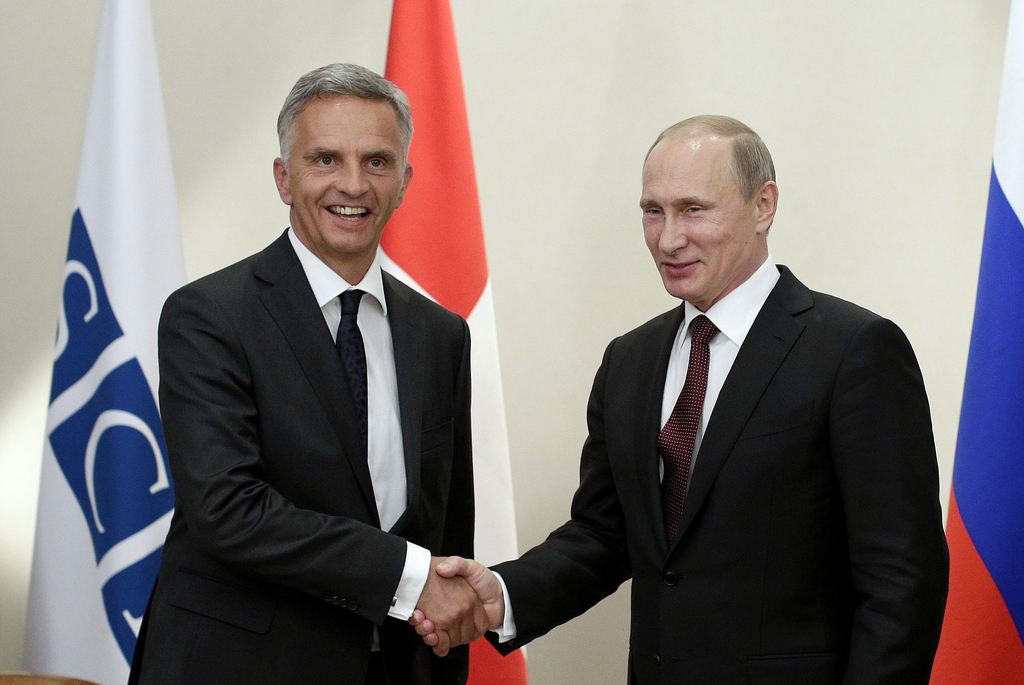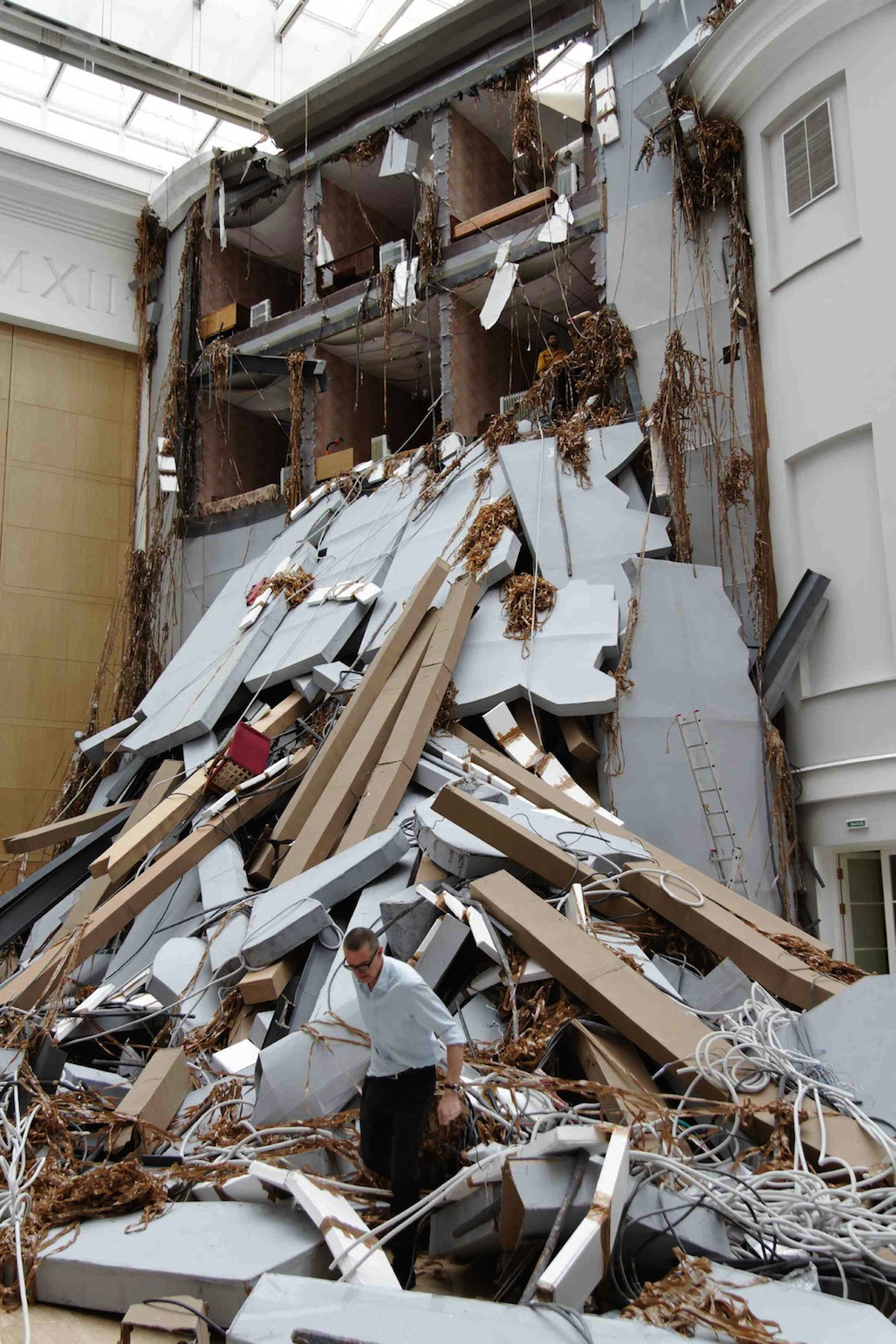
Swiss-Russia bicentenary marked despite Ukraine

In 1814 Russia helped Switzerland towards unity, the first diplomatic step in relations which have more or less remained stable since. The Ukraine crisis is, however, threatening to overshadow the bicentenary. But the jubilee programme puts culture ahead of politics.
“It’s an honourable defeat and a diplomatic success,” exclaims Swiss senator Filippo Lombardi, the organiser of a rather special chess match. It’s a hot June day, and in a room inside the Swiss Parliament, packed full of journalists, 12 Swiss and Russian parliamentarians have just been competing. Among them, the legendary chess grandmaster Anatoly Karpov, a pro-Putin member of the Russian parliament.
The good humour does not seem to be tarnished by the Swiss team’s defeat 1:2 or by the criticisms of the event taking place during the Ukraine crisis, which has seen Russia annex territory in Ukraine, leading to a cooling of relations with the West.
Swiss team member and president of the centre-left Social Democratic Party Christian Levrat, who has enjoyed meeting Karpov, said that the chess could be separated from recent events. “Even in the worst periods of tension, such as the Cold War, matches always took place.” Party colleague Andreas Gross added soberly: “I am here for the chess”.
Swiss debt
Bicentenary celebrationsExternal link kicked off during the Sochi Winter Olympic Games this year, with ministerial meetings. Swiss President Didier Burkhalter visited Moscow in May, but talks were focused on Ukraine, with Burkhalter also holding the presidency of the Organisation for Security and Co-operation in Europe (OSCE).
The role has given the Swiss increased visibility but it has also involved trying to preserve excellent Russian-Swiss relationsExternal link while defending neutrality and international law.
Announced as taking place “in spring”, Burkhalter’s official jubilee trip to Moscow hasn’t yet been firmed up.
Also up in the air, the September visit by a Russian parliamentary delegation led by Sergei Naryshkin, president of the Duma, the lower house of the Russian parliament.
People first
Lombardi nevertheless remains enthusiastic about the anniversary. “In 1814 and 1815, Russia played a very important role in affirming Switzerland’s neutrality, independence, territorial integrity and its federalism. At the Congress of Vienna, Russia managed to sell this “package” to neighbouring powers, who had their eyes on Switzerland, he said.
“The idea of the bicentenary is to highlight people … who formed the base of the two countries’ relations, who have done or said something important. Given what is currently happening, it was the right decision,” said Christine Honegger Zolotukhin, in charge of cultural affairs at the Swiss embassy in MoscowExternal link.
For historian Hans Ulrich Jost: “Russia very early on became an Eldorado for the Swiss. Between the 17th century and 1917, 20,000 Swiss left to seek their fortune there. It is such a visible emigration as many had top positions or became rich.”
In turn, Switzerland welcomed aristocrats, writers, artists, students and revolutionaries (8,500 Russians in 1910), exiles, dissidents and oligarchs. Today 10,000 Russians live in Switzerland.
Culture as a bridge
The Swiss foreign ministry and its promotional body, Presence Switzerland, have worked with the Federal Office of Culture and the Swiss arts council, Pro HelvetiaExternal link, which itself has launched a huge cultural programme for 2012-2015.
It includes music, dance, visual arts and literature, the economy, innovation and medicine, as well as education, food, watches, wine and chocolate. Geneva, which is celebrating the 200th anniversary of its entry into the confederation, is, for example, sending its Vieux Grenadiers to the International Military Music Festival in Moscow.
“We had 150 projects by the end of 2013 and have done 40 since the beginning of 2014,” explained Christophe Rosset, head of the programme at Pro Helvetia. “The programmes are partnerships between Swiss and Russian institutions. We cover 30% of the budget of the exchange programme, the Russian partners 50% and the Swiss partners (institutions and cantons) 20%.”
On the Russian side the “cultural season” opened in March with around 50 projects, of which 30 are cultural,” said Eléna Arkhipova, cultural attaché at the Russian embassy in BernExternal link.
Collaboration
How is the collaboration working? “Very well because the Russians are very interested,” replied Honegger Zolotukhin. “Our programmes aren’t necessarily linked because our countries work in different ways, also in planning. We have looked for Russian partners and given frameworks (type of project, place).” The programmes are not yet finalised and are in constant development, she said.
“Our projects are more traditional because our country has a less rich contemporary culture in relation to the number of inhabitants. And we have a multitude of different peoples, so it’s difficult to find common ground” said Arkhipova.
The Russian Culture Ministry is presenting ballets, concerts and exhibitions from prestigious institutions such as the Bolshoi Theatre or the Hermitage Museum. The foreign ministry has to find semi-private sponsors, added Arkhipova. For example, the Magic of Russian Landscape. Masterpieces from the State Tretyakov Gallery, Moscow, which is showing at the Cantonal Fine Arts Museum in Lausanne, has been financed by the Honorary Consulate of the Russian Federation in Lausanne.
Musical collaboration can be seen at the Moscow Conservatory with Alpenfest, a Russian-Swiss contemporary music project. Swiss singer Nicolas Fraissinet has also been performing in Russia, a memorable experience. “The public reaction was very warm, and even moving at times. I sometimes had the impression that feelings are felt more immediately and spontaneously than here,” he said.

Graphic artist Niklaus Troxler is staging a poster exhibition in St Petersburg, Vladivostok, Krasnoyarsk and Moscow. “The Russians have a different background, very constructivist, but they are open and spontaneous,” he said.
The Weltformat Festival in Lucerne, which is behind the project, has also invited Russians over. “One shouldn’t always look at the political aspect, because culture can do a lot in terms of understanding and exchange, and we have to nurture that,” said Troxler.
Paradox of history
For historian Hans Ulrich Jost, “Modern Switzerland could be said to be a little bit like Russia’s child”. “Russia entered into Swiss political live at the Congress of Vienna in 1815. Austria was in favour of a dismantlement and a possible return to the Ancien Régime (pre-revolutionary France), but Russia insisted that Switzerland, with its 19 cantons and neutrality, was left alone. Without this intervention, one cannot say for sure whether Switzerland, which was on the point of breaking up and civil war, would have survived.” The way was also paved for 22 cantons, with the arrival of Geneva, Valais and Neuchâtel.
Thomas Bürgisser, researcher at the Diplomatic Documents of Switzerland, points out that Swiss-Russian relations reached their zenith at their beginning. “I would say that the figure 200 years gives the impression of a continuity which doesn’t exist, because it covers a history between the two countries that is very contradictory, heterogeneous and turbulent. Another paradox is that it started at a time when Switzerland did not yet exist, as the federal state only came into being in…1848.”
(Translated from French by Isobel Leybold-Johnson)

In compliance with the JTI standards
More: SWI swissinfo.ch certified by the Journalism Trust Initiative



























You can find an overview of ongoing debates with our journalists here . Please join us!
If you want to start a conversation about a topic raised in this article or want to report factual errors, email us at english@swissinfo.ch.